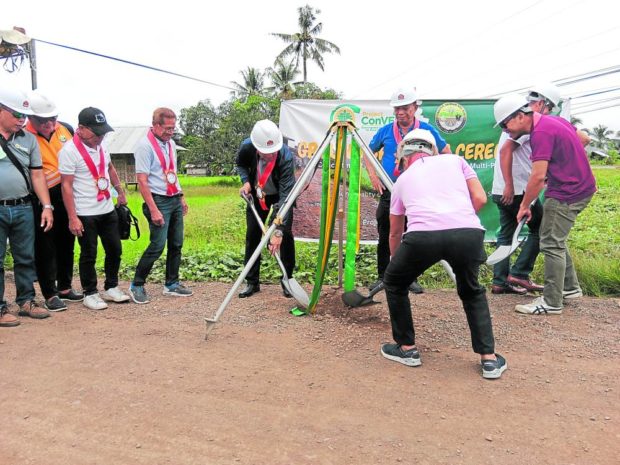Agusan del Sur co-op can sell rice at P30 per kilo

GETTING GOVERNMENT’S SUPPORT Officials of the Department of Agrarian Reform and other agencies launch a road-concreting project in Trento, Agusan del Sur which, when completed, will help the Sempco farmers’ cooperative bring their cheap rice to more public markets. PHOTO CONTRIBUTED
TRENTO, Agusan del Sur — A cooperative of rice farmers in this northeastern Mindanao province is showing how the country’s chief commodity can be made as affordable as that price range which you must have heard in the presidential campaign just this year.
Southern Agusan Multi-Purpose Cooperative (Sampco) in this municipality is selling rice for only P1,500 to P1,800 per 50-kilo bag—or P30 per kilo of regular-milled rice to P36 per kilo of well-milled rice.
Nationwide, regular-milled rice sells at P38 to P45 a kilo.
That is also the price range at Trento’s public market. Elsewhere in the Caraga region, regular-milled rice is sold at an average of P37.60 per kilo, while well-milled rice is about P39.96 per kilo, according to data from the Philippine Statistics Authority.
Maximo Gegato Jr., manager of Sampco, said members of the cooperative are mostly beneficiaries of the government’s land reform program.
Article continues after this advertisementHe said they are able to sell rice at a much lower price because they have their own rice mill and have cut down costs usually charged by middlemen, or dealers, in the distribution of the staple.
Article continues after this advertisementJamil Amatonding Jr., provincial program officer of the Department of Agrarian Reform (DAR), said Sampco’s milling “complex” comes complete with such equipment as a multi-pass miller and solar and mechanical batch dryers.
Support from DAR, UN
The cooperative bought the P48-million plant at the height of the COVID-19 pandemic in 2020, through a loan from the International Fund for Agricultural Development (Ifad)—a financial institution of the United Nations.
The palay are the harvests of Sampco and other agrarian reform communities from this town as well as the municipalities of Bunawan, Sta. Josefa and Veruela.
DAR said these localities have 33,425 has. of rice fields which produce some 128,435 metric tons of palay.
Ifad also provided the farmers financial support so they could go into mechanized farming.
Sampco produces 200 50-kilo bags of rice a day. Amatonding said the farmers are their own dealers and are thus able to offer good prices to consumers.
He also cited a road project that is expected to be completed this month and improve “connectivity” between the coop’s plant and the other towns where it gets its palay.
Amatonding sees the farmers earning more as they aim to expand their milling capacity.
If that happens, said Gomer Tumbali, project manager of Ifad, Sampco will soon be able to sell rice at P25 to P30 per kilo in more markets.
Marcos’ promise
Sampco’s venture into selling affordable rice brings to mind President Marcos’ election campaign promise.
In April, he said he would work to “bring down the price of rice [to] P20 to P30 per kilo” by subsidizing production, putting a price cap on the staple, and reducing the country’s dependence on imports. INQ